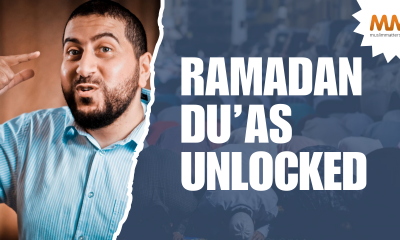Domestic Violence Series
The End to Hitting Women: Islamic Perspective on Domestic Violence | Imam Abdullah Hasan
Published

A note on translations:
One of the principle reasons why the verse under discussion has been misunderstood is due to incorrect translations by various translators of the Qur’ān over the centuries. Even a cursory look at some of the translations will demonstrate how the divine intended meaning has been lost.
For example:
Abdullah Yusuf translates Q. 4:34 in the Saudi revision of 1985, in the following manner:
Keep supporting MuslimMatters for the sake of Allah
Alhamdulillah, we're at over 850 supporters. Help us get to 900 supporters this month. All it takes is a small gift from a reader like you to keep us going, for just $2 / month.
The Prophet (SAW) has taught us the best of deeds are those that done consistently, even if they are small. Click here to support MuslimMatters with a monthly donation of $2 per month. Set it and collect blessings from Allah (swt) for the khayr you're supporting without thinking about it.
“Men are the protectors and maintainers of women, because Allah has given the one more (strength) than the other, and because they support them from their means. Therefore the righteous women are devoutly obedient, and guard in (the husband’s) absence what Allah would have them guard. As to those women on whose part ye fear disloyalty and ill-conduct, admonish them (first), (Next), refuse to share their beds, (And last) beat them (lightly); but if they return to obedience, seek not against them Means (of annoyance): For Allah is Most High, great (above you all).”
However, a more accurate translation is provided by Professor Abdel Haleem[36]:
“Husbands should take good care of their wives; with [the bounties] God has given to some more than others and with what they spend out of their own money. Righteous wives are devout and guard what God would have them guard in their husbands’ absence. If you fear high-handedness from your wives, remind them [of the teachings of God], then ignore them when you go to bed, then hit them. If they obey you, you have no right to act against them: God is most high and great.’’
Like many other translators, Abdullah Yusuf Ali translates the al-rijāl to denote the apparent meaning of the word. Translating al-rijāl as men gives the impression that this verse is referring to the relationship between men and women in general. However, looking at the context of the verse, and the works of many early and modern scholars, readers will learn that “men are qawwāmūn over women” only describes the relationship between husband and wife within the family. Abdel Haleem explains this crucial misinterpretation by stating: “Let us consider some terms in this verse. First we have “men” and “women”. They mean “husbands” and “wives”, as the passage goes on to mention intimate relations between couples and arbitration that may lead to divorce. Why does the verse not say “husbands” and “wives”? Because the word “zawj” (which in modern Arabic means husband) applies in classical Arabic to both sexes. It has no feminine; it is like the English word “spouse”, and it would not have made sense to say “spouses are given more than spouses”. This can also be seen in other parts of the Qur’ān were “husbands” and “wives” are mentioned; the same terminology of “men” and “women” is used. The verse is thus talking about “husbands” and “wives”, not “men” and “women” in general. This distinction is important because those who misunderstand the verse take it to mean that God has given men in general more than women in general, applying that very extensively and interpolating what they think men are given more of .e.g. strength, intelligence, wisdom; even having a beard is listed by some! Then they go on from this to say that women cannot be judges, heads of state or in any position of leadership over men.” [37]
Such differences which arise in translations and commentaries arise because translators and exegetes have differing world views, different knowledge of Arabic, the Islamic sciences, as well as different methods of approaching the text. The specific differences between Abdel Haleem and Yusuf Ali have resulted in some misunderstandings which Abdel Haleem further addresses in his book Understanding the Qurān.[38]
Although I prefer Abdel Haleem’s translation, I still have reservations of his translation of the word waḍhribūhuna. I will present an alternative translation based on his overall translation at the end of the article.
A note on language:
The root word composed of the three letters ḍ-r-b has numerous connotations and implications. It is important to survey, albeit very briefly, the various contexts this idiom has been employed in the Qur’ān. This will demonstrate the accuracy of the Qur’ān and its exactness when addressing detailed and specific issues. Although this is not the primary argument of this study, nevertheless, it may provide some support to the overall contextual and accurate purport of the expression that this study is presenting.
The imperative verb iḍrib is formed from the root verb ḍaraba. Ḍaraba has various meanings in the Arabic language, some of which I include below:
Ḍaraba vb. (I) ~ to strike, smite, stamp, beat; to liken or strike (a parable or similitude), to cite (an example or a dispute); (ḍaraba fī al-’arḍ) to journey; to draw or cast (a veil); (with prep. ‘ala) to pitch on, to stamp; (with prep. ‘an) to turn something away; (with prep. bayn) to set up between, to separate, (n.vb) striking, smiting, etc.; (with prep. fī) journeying.[39]
In the Qur’ān, God employs the various meanings of ḍaraba in the following verses:
– In verses 2:273, 3:156, 4:101, 5:106, 73:20, and 4:94 to mean “to journey in the land/God’s path”:
[Give] to those needy who are wholly occupied in God’s way and cannot travel in the land [for trade]. The unknowing might think them rich because of their self-restraint, but you will recognize them by their characteristic of not begging persistently. God is well aware of any good you give. (2:273)
So, you who believe, be careful when you go to fight in God’s way, and do not say to someone who offers you a greeting of peace, ‘You are not a believer,’ out of desire for the chance gains of this life- God has plenty of gains for you. You yourself were in the same position [once], but God was gracious to you, so be careful: God is fully aware of what you do. (4:94)
– In verses 14:24, 14:25, 14:45, 16:74, 16:75, 16:76, 16:112, 17:48, 18:32, 18:45, 22:73, 24:35, 25:9, 25:39 in order to propound/cite an example, similitude, or parable:
[Prophet], do you not see how God makes comparisons? A good word is like a good tree whose root is firm and whose branches are high in the sky. (14:24)
– In verses 8:12, 47:4, 47:27, 8:50 to mean “smite/strike their necks/beat”:
Your Lord revealed to the angels: ‘I am with you: give the believers firmness; I shall put terror into the hearts of the disbelievers- strike/smite above their necks and strike all their fingertips.’ (8:12)
• In verse 18:11 to mean conceal/cover over their ears:
‘’We sealed their ears [with sleep] in the cave for years.’’ (18:11)
• In verse 24:31 to mean “draw/cast [the ends of] their head-coverings over the bosoms”:
‘’And tell believing women that they should lower their glances, guard their private parts, and not display their charms beyond what [it is acceptable] to reveal; they should let their headscarves fall to cover their necklines and not reveal their charms except to their husbands…’’ (24:31)
• In verses 2:60, 26:63, and 38:44 to mean “strike with”:
‘’Remember when Moses prayed for water for his people and We said to him, ‘Strike the rock with your staff.’’ (2:60)
‘‘Take a small bunch of grass in your hand, and strike [her] with that so as not to break your oath.’’ (38:44)[40]
It is important to mention here that whenever the imperative verb iḍrib is used in the Qur’ān to denote ‘strike’, the Qur’ān qualifies such an imperative by including an instrument of striking:
2:60 – Strike the rock (2) with your staff (1)
2:73 – Strike him (the body) (2) with a part of it (heifer – a young cow) (1)
7:160 – Strike the rock (2) with your staff (1)
8:12 – Strike off their heads (2) and strike off every fingertip (2) of them
8:12 – Strike off every fingertip (2) of them.
20:77 – Strike for them a dry path in the sea (See 26:63 – elaborated – Strike the sea (2) with your staff (1)
38:44 – Take in your hand a bundle of rushes (1), and strike with it
It is only in Q. 4:34 that the imperative verb iḍrib not accompanied by an object or part of the body by which to strike. This anomaly, combined with the fact that there is no apparent qualification with regards to the means or severity of the beating, makes it unlikely that the imperative waḍribūhunna ought to be understood as an imperative ordering Muslim men to hit their wives.[41] Even if it is asserted that the imperative here denotes mere permissibility and not a command (yufīd al-‘ijāza wa laysa al-‘amr) as many scholars have posited[42] —the verse still seems to license the husband to hit his wife. The proposal of this study is that God does not intend any such hitting by His use of the word ḍarb.
Abdul Ḥāmid A. Abū Sulaymān[43] argues that since “the root verb ḍaraba has several figurative or allegorical connotations, among which are:
• totravel or to depart
• to block the ear or prevent it from hearing
• to neglect, ignore and abandon
• to make truth and falsehood evident and distinguishable from the other
• to drawing a woman’s head covering over her own bosom
• to strike a path through the water pushing it aside.
• to partition or separate.
• to be overshadowed by ignominy (with regards to people)
• to cut, to slash, and to strike.
· in the rest of the verses, however, it means to impel, to shock, to slap, or to damage.[44]
In this vein, Abū Sulaymān argues, waḍribūhunna means ‘to separate’. In other words, when the husband encounters ill-conduct from his wife, he is advised to follow the two preliminary steps for reconciliation. In the event those two fail, he is told to separate from his wife.
The fact that the Prophet himself, in the event of marital strife, separated from his wives’ by leaving their homes and never hit them lends support, Abū Sulaymān argues, to this opinion.
Keep supporting MuslimMatters for the sake of Allah
Alhamdulillah, we're at over 850 supporters. Help us get to 900 supporters this month. All it takes is a small gift from a reader like you to keep us going, for just $2 / month.
The Prophet (SAW) has taught us the best of deeds are those that done consistently, even if they are small. Click here to support MuslimMatters with a monthly donation of $2 per month. Set it and collect blessings from Allah (swt) for the khayr you're supporting without thinking about it.
Sh. A. Hasan is an experienced scholar, independent counsellor & psychologist, and community leader with over 20 years dedicated to Islamic studies, mental health, and community service. His academic journey began with an Imam Diploma, BA, and Ijaza Aliyah in Islamic Studies, where he specialised in Theology and Islamic Law. He pursued further studies in Fiqh (Islamic jurisprudence), Muslim family law (Ahwal al-Shaksiyat), Aqidah (Islamic theology), Usul al-Fiqh (Principles of Jurisprudence), Tafsir (Qur’anic exegesis), Usul al-Hadith (Hadith methodology), Ifta (Islamic legal verdicts), and comparative fiqh and other disciplines all taught entirely in Arabic from an European Islamic Seminary. He also holds a diploma in Arabic from Zarqa Private University in Jordan, where he also studied at the college of fiqh and Usul (Kulliat fiqh wa usuluhu) and received tutelage under renowned scholars from across the Middle East. In addition, he expanded his expertise into psychology and counselling. He studied certifications and diplomas in Person-Centred Psychotherapy, Marriage and Youth Counselling, Egan Model, and SFBT Psychotherapy. Over the past 15 years, he has supported clients facing a wide range of Islamic psychological challenges, including trauma, PTSD, suicide ideation, sexual abuse, depression, anxiety, grief, self-esteem issues, and marital discord, to name some. His approach integrates Islamic principles with modern authentic and evidenced based psychological practices, aiming to provide holistic care. Having studied MSc in Applied Psychology from the London Metropolitan University, he is currently completing a doctorate in the same field. He is a founding trustee of The British Board of Scholars & Imams (BBSI) and a member of The Global Imams & Scholars Council (GISC). He has also founded and led initiatives such as Imams Against Domestic Abuse (IADA), the British Imams, Scholars Contributions and Achievements (BISCA) Awards, and the British Institutes, Mosques, and Associations (BIMA) Awards. Sh. A. Hasan’s passion for mental health is reflected membership of The Association of Islamic Mental-Health Specialists (AIMS). He teaches Islamic Psychology & Counselling Psychologist at Spring Foundation and provides chaplaincy counselling at various mosques in London, UK, offering support that integrates Islamic teachings with evidence-based psychological interventions.


I Can’t Stop Thinking About Someone | Night 10 with the Qur’an

Fifteen Years in the Shadows: The Strategic Brilliance of the Hijrah to Abyssinia

Ramadan As A Sanctuary For The Lonely Heart

Cultivating A Lifelong Habit Of Dua In Children

When to Walk Away from Toxic Friends | Night 9 with the Qur’an

30 Nights with the Qur’an: A Ramadan Series for Muslim Teens

How to Make this Ramadan Epic | Shaykh Muhammad Alshareef

[Podcast] Guardians of the Tradition: Muslim Women & Islamic Education | Anse Tamara Gray

Who Am I Really? What Surat Al-‘Asr Teaches Muslim Teens About Identity | Night 1 with the Qur’an

Starting Shaban, Train Yourself To Head Into Ramadan Without Malice

I Can’t Stop Thinking About Someone | Night 10 with the Qur’an

When to Walk Away from Toxic Friends | Night 9 with the Qur’an

What Islam Actually Says About NonMuslim Friends | Night 8 with the Qur’an

Week 1 in Review: Is Your Teen Actually Changing? | Night 7 with the Qur’an

Why Your Teen Wants to Change Their Muslim Name | Night 6 with the Qur’an
Trending
-

 #Islam2 weeks ago
#Islam2 weeks ago30 Nights with the Qur’an: A Ramadan Series for Muslim Teens
-

 #Current Affairs1 month ago
#Current Affairs1 month ago[Podcast] Should Muslims Ally with Conservatives or Progressives? | Imam Dawud Walid
-

 #Islam4 weeks ago
#Islam4 weeks agoHow to Make this Ramadan Epic | Shaykh Muhammad Alshareef
-

 #Life1 month ago
#Life1 month ago[Podcast] The Parts of Being an Imam They Don’t Warn You About | Sh Mohammad Elshinawy




Fritz
December 22, 2013 at 7:28 AM
Sad to say, psychological abuse is probably more common that physical abuse (and both are deplorable)
Unfortunately, the former is very often perpetrated by woman (sometimes unknowingly) and can be just as toxic. It would be great to see an article also deal with this element to provide a comprehensive warning.
Shazan
December 22, 2013 at 10:01 AM
Assalam o Alekum!
Jazakillah khair Brother! This is a burning issue and require considerable attention.
Mahmud
December 22, 2013 at 11:26 AM
Assalamualaikum wa rahmatullahi wa barakatuh
What makes me uneasy is that it seems to be clear that the word means “hit” literally as the hadith on the matter are pretty clear….the ayah was revealed and then the women complained an so on……..
Mahmud
December 28, 2013 at 1:48 AM
Assalamualaikum wa rahmatullahi wa barakatuh
Can I at least get a reason as to why my comment was edited? I merely started it with expressing gratitude to the Imam for defending the apostasy law in Islam(where the murtad is killed) and then said I felt a bit uneasy about the conclusions here……
What is wrong with that? May I get a reason?
Aly Balagamwala | DiscoMaulvi
December 29, 2013 at 1:20 AM
Your wording was unclear and we couldn’t understand what you were trying to convey in the beginning of the comment.
Mahmud
December 29, 2013 at 11:46 AM
Best to assume well then…..
In any case, while I find this article to be pretty strange, I say, Imam Abdullah Hasan has been helpful to me, I loved his website(when it was up!) as he had a very nice article on Ibn Ashur and other stuff we might not easily find easily elsewhere which is always something to appreciate.
In addition, I can’t thank him enough for his explanation of certain hudud laws, the difference of opinion among Ulema concerning it, and he finally made the apostasy law make sense as I didn’t fully understand it before(although every law in Sharia must be accepted even if we do not understand it.)
Here is the wonderful blog he used to use, it has very nice explanations of certain Hudud laws, and the beautiful explanation of the apostasy bit is on the bottom:
http://maqasid.wordpress.com/2008/07/30/unnatural-offences-the-controversy/
Good to see an Imam with a strong foundation in Arabic and Fiqh. Islam QA is nice because they should daleel in English translation and everything, but Imam Abdullah Hasan explained it in a very easy to understand manner.
Fiqh is usually something not easy on the layman so I naturally appreciate it when someone is willing to go into the time and detail necessary to explain a certain issue, especially controversial modern ones and not be apologetic.
Aly Balagamwala | DiscoMaulvi
December 30, 2013 at 12:20 AM
I understood that clearly worded comment Alhamdulillah. :)
-Aly
*Comment above is posted in a personal capacity and may not reflect the official views of MuslimMatters or its staff*
GregAbdul
December 22, 2013 at 4:27 PM
don’t want to diss or sidestep this, but the real issue is Muslim teens. I just got battered by my son. He refuses to study. The go into a funk at about 13 and fight to not come out of it. At the time they should be launching themselves into the world, they sulk and underperform and expect parents to take care of them forever. I am pretty sure this is more wide spread than the battering. I know not to hit my wife. My kid doesn’t know he’s not supposed to hit me. So who’s out here to stop me from ending up in an emergency room? I’ve talked with the police. It’s like, since I’m a guy…so what?
RCHOUDH
December 24, 2013 at 5:56 PM
Salaam Brother,
I pray things get better between you and your son. Do you know if anything is bothering him at school or if he’s having trouble understanding certain subjects? Sometimes kids act out of tremendous stress and anxiety over school. Hopefully things will get better for your son soon In sha Allah.
Motie Omari
December 22, 2013 at 6:43 PM
Asalamu alaikum wa rahmatullahe wa barakatuh
Jazaka Allahu khairan Imam Abdullah for writing this exceptional essay on 4:34 and to MM for publishing the above article.
ISNA Horizons magazine several years ago dedicated a whole issue on Domestic Violence and included was the essay you quoted for Dr. Abdulhamid Abu Sulayman; highly recommended along with your essay
[http://theamericanmuslim.org/tam.php/features/articles/quran_434_chastising_women_a_means_to_resolve_marital_problems/]
Also, a Qur’an student in the UK has published a website and 88 page book solely dedicated to ayah 4:34 that can be read for free at his site or bought from Amazon. *
[http://quran434.com/]
Also; here’s a helpful essay by Yusuf Estes to help couples maintain the love and respect in their marriages and hopefully will never ever face discord or any type of abuse:
28 Tips To Be A Successful (Muslim) Spouse!
– Yusuf Estes
[http://islamnewsroom.com/news-we-need/1779] *
May we all be blessed and guided to better understand the teachings of the Qur’an and Sunnah in sha Allah.
Thank you, your brother,
Motie Omari مطيع العمري
P.S. In regards to the respectable brother who stated that his son was hitting him; very sorry to read that, many kids get influenced from the violence in video games, abusive friends, or even abusive siblings/parents; not necessarily physically, rather emotionally or verbally
We make dua’ that perhaps a local Imam/Scholar or family therapists trained in family counseling can assist your family and son to find out why he hit his own father, wa nauthu billah.
===========================================================
* NOTE from Yusuf Estes: Marriage is considered “Half the Deen” (very important part of Islam).
Yet we are seeing failures in marriages all around us. Family fights are on the rise, women and children are being abused and many families are falling apart. More and more marriages are ending up in divorce even amongst the most religious of families, and the Muslims are no exception.
So many marriages are failing these days, even amongst the most religious of families, and Muslims are no exception.
This greatly saddens me and I hope by publishing this article here on our website, we might come to a better understanding and better relationship with our spouses, in sha’ Allah.
mustafa
December 22, 2013 at 6:58 PM
salaam, here is another one witten by amer jamil: http://www.unityfamily.co.uk/files/What_Islam_Really_Says_About_Domestic_Abuse.pdf
mustafa
December 22, 2013 at 7:02 PM
Has anyone watched this?
http://www.youtube.com/watch?v=p_Vo4NkfddY
mustafa
December 22, 2013 at 7:06 PM
sheikh abdullah adhami’s interesting video on wife beating
http://www.youtube.com/watch?v=pKMPVpjYrN4
25 years In Islam
December 23, 2013 at 4:11 PM
Verbal Abuse can be worse than Physical Abuse especially if your spouse is manipulative. People often assume you did something to deserve the abuse, so you get no support or sympathy. May Allah protect us from all forms of violence.
SisterX
December 30, 2013 at 11:25 PM
I appreciate this topic being presented. It would be nice if more articles on MM could also address issues of domestic violence, as well as emotional and verbal abuse.
In my personal experience, I think both the abuser and the abused are well aware that these behaviors are not encouraged by Islam. Unfortunately Islamic rulings are often wrongly used to justify and allow the abuse to continue to take place because there is such an emphasis on obeying the husband. The wife, meanwhile often has no support in the community because there is a feeling that it is a private manner, she should not expose his mistakes, and that perhaps some may feel that she somehow deserves the abuse.
On the other hand, Islamic rulings can be a source of empowerment to Muslim women. Understanding your rights in Islam can help you identify when your rights are being violated.
cedar
December 24, 2013 at 1:27 AM
While I myself am not knowledgeable in this area. I still find it odd to break from the overwhelming majority opinion on this topic. There are also multiple sources from the sunnah (more explicit, less ambiguous) that bolster the majority view. I can see the need to advise people, but to sidestep this and portray this view as mistaken is very hard for me to accept :)
RCHOUDH
December 24, 2013 at 6:02 PM
Jazakillah ul khair for this informative article. I’ll be sure to finish reading it soon and pass it on to others who may benefit from it. I was recently speaking to someone about the issue of domestic violence in Muslim communities and, while conceding that it is a major problem, he also said that other sorts of abuses take place in Muslim communities too, such as parental abuse. I stated that while it’s true about other forms of abuse being prevalent right now unfortunately (whether it was parental, child, and/or sexual abuse) I couldn’t think of any other abuse where Islam was used to “justify” said abuse like spousal abuse. That particular ayat has been misinterpreted all too often by people who fail to take into context and apply it properly to the real world.
Hina Ansari
December 24, 2013 at 10:12 PM
Asalamu-alaikum warahmatullahi wabarakatuh,
JazakAllah Khayr for this highly essential, revealing and explanatory article, and for the links posted in the replies/comments above.
I will inshaAllah pass this on.
Wasalaam
Riz Khan
December 25, 2013 at 2:23 AM
Mashallah! great effort and we as one Ummah require such efforts on large scale. I was looking at the list of countries given in the article “The Best and Worst Places for Women” link below
http://www.thedailybeast.com/articles/2011/09/20/best-and-worst-countries-for-women-the-full-list.html
All the best countries for women are non muslim countries while the worst lies down the list are mostly muslim countries.
Some shocking facts- the worst country according the list is Chad (165), Aghanistan, Yemen, Democratic Republic of the Congo, Mali, Solomon Islands, Niger, Pakistan, Ethiopia, Sudan, Guinea, Sierra Leone, Nigeria, Guinea-Bissau, Benin, Côte d’Ivoire, Cameroon, Central African Republic, Saudi Arabia (147).
The best countries according to the list are Iceland (1), Sweden, Canada, Denmark, Finland, Switzerland, Norway, United States of America, Australia, Netherlands, New Zealand, France, Luxembourg, Portugal, Republic of Macedonia, Republic of Moldova, Philippines, Belgium, United Kingdom Romania (20).
I was shocked to find Saudi Arabia and Pakistan amongst the worst 18 countries for women. Let us suppose for a moment that this list is not correct; still we all know the women position in muslim countries is not exemplary. We all know Islam gave unprecedented rights to women but why this is not reflected by the society. Is there anything wrong? was/is our scholars and prominent leaders somewhat lax in this respect? There is a need of such initiative taken by all the muslim scholars. Those who lead prayers should emphasise to treat women gently, respectfully and with love. Each and every forum should be use to advocate for the rights of wormen. It is disgusting to find muslim countries with high domestic violence.
‘
Riz Khan
December 25, 2013 at 9:29 AM
A good idea for muslim women seems to be having martial arts training before marriage.. at least a black belt. Also giving permission to husbands to have 4 wives may prove beneficial as four wives are more likely to beat a single husband than the other wary around.
Mahmud
December 26, 2013 at 5:01 PM
Assalamualaikum wa rahmatullahi wa barakatuh
Advertising is allowed but my comments aren’t? The most I said was I felt uneasy with the conclusion……….
Aly Balagamwala | DiscoMaulvi
December 27, 2013 at 8:54 AM
WaAlaikum Assalam Wa Rehmatullahi Wa Barakatuhu:
You are on moderation, the spammer is now on the spam list. All comments are subject to our comments policy. Please don’t go down the why path again. Any moderated comments will take time to approve or may not be approved.
Best Regards
CommentsTeam
Pingback: "স্বামী কি স্ত্রীকে মারতে পারবে?" - আল-কুরআনের প্রাচীন অনুবাদ বনাম আধুনিক অনুবাদ | Blog | Yousuf Sultan
Mahnoor Khalid
January 2, 2014 at 4:09 AM
Assalam.o.alaekum
Women’s rights have got a great importance in Islam. Islam does not allow to beat women.
In a Hadith the Prophet (p.b.u.h.) is reported to have said: “How does anyone of you beat his wife as he beats the stallion camel and then he may embrace (sleep with) her?”
Quran is the central religious text of Islam,According to Quran the relationship between the husband and wife should be based on mutual love and kindness. Allah says: “And among His Signs is this, that He created for you mates from among yourselves, that ye may dwell in tranquility with them, and He has put love and mercy between your (hearts): verily in that are Signs for those who reflect.” (Quran: Ar-Rum 21)
Parvez
January 14, 2014 at 3:31 PM
I have a question as to how is the word daraba in the Quran [4:34] meptaphoric and not literal?
regarding the verse [Surah nisa verse 34];
Ibn `Abbas (ra) and several others said that the Ayah refers to a beating that is not violent. Al-Hasan Al-Basri said that it means, a beating that is not severe. [Tafsir Ibn kathir]
The most prominent sahaba in regards to tafsir of the Quran ; Abdullah Ibn Abbas (ra) surely has more authority then Ata ibn Rabah.
All the 4 Madhabs understood the particual part of the verse as literal and also all the verses of the Quran related to social, marital, fiqh matters are to be taken as what the verse apparently states thus literally.
The Quran is the clear book of guidance and not a book of secret codes.
If the particular daraba in verse [4:34] is metaphoric and means anger and not literal, then why did most of the classical scholars understood it as literal?
why is there not an arabic word clearly stating anger in that verse?
This clearly proves that verses related to fiqh and social matters are to be taken as literal.
lets not change the interpretation of the Quran in order to please the athiest and agnostics.
Our purpose of following the Quran is only to please Allah (swt).
hence the verse means lightly hitting the wife as last resort if she is rebellious.
even the human history of ten of thousands of years followed this way as lightly hitting the rebellious wife as last resort.
the fiqh laws of the quran is practical and does not go against the human nature.
just because the non muslims have changed their moral values and social values does not mean we should follow them. in fact the kaafir’s radical change clearly proves they were wrong in many social and moral matters therefore there is no evidence to suggest that some how after 10,000yrs that all of a sudden they know what is right now with no authority from Allah.
MuFu
September 23, 2015 at 4:04 PM
While I agree with you that womans can make use of heavy mental violence in a partnership and that this is not seen as harmful as physical violence I must remind here, if you want to have the right to hit your woman you are doing good doing this in a country where it isnt forbidden. Like it or not, find it reasonable or not, but in a western society we have to bow to western laws and therfore we dont hit anyone, be it woman or man. Hitting was never a good solution in a conflict, it is shutting down the expression of dissatisfaction of the other at that moment _but_ it doesnt solve the true problem!
Parvez
November 5, 2015 at 10:26 PM
Yes I agree that if the law states no hitting unconditionally than its ok to follow such law.
However the writer of the article seems to suggest that the religion itself implies such law, which i respectfully disagree due to few reasons.
please note Islam does not support abuse and the beating of women, words whose meanings are reflected from experiences of violence against women in the west. People have to be careful with their words. The fact that Prophet Muhammad never hit one of his wives does not mean it is not allowed for a husband to do so when the Qur’an has permitted it. This is a logical fallacy and it does not take someone a great distance to discover that there are many narrations where Prophet Muhammad upheld the permission of correcting one’s wife using a physical reprimand
1. There is no authentic chain of narrators back to ‘Ata regarding the writer’s argument. This is important, especially if someone wants to use it to change the meanings of all other evidence on the issue.
2. It is only a statement of ‘Ata and cannot stand against hadith. The author’s idea cannot explain the ‘chastise them in a way that leaves no mark’ (dharb ghayr mubarrih) phrase in the hadith of the Farewell Pilgrimage when the Messenger of Allah said:
“Fear Allah concerning women! Verily you have taken them on the security of Allah, and intercourse with them has been made lawful unto you by words of Allah. You too have rights over them, that they should not allow anyone to sit on your bed whom you do not like. But if they do that, (in that case) chastise them in a way that leaves no mark (i.e. not severe). Their rights upon you are that you should provide them with food and clothing in a befitting manner.” [Muslim – hadith 2950]
It is important here to make the point that this statement is reported by Muslim and it refers to the last pilgrimage of Prophet Muhammad, just three months before his death, which refutes the idea that there was a transition in culture from Mecca to Madinah.
3. ‘Ata hismelf narrated, I asked Ibn ‘Abbas: What is the beating that leaves no marks? He said, ‘With a tooth stick and the like.” [Al-Tabari, Ibn Jarir, Jami‘ al-Bayan fi Ta’wil al-Qur’an]
4. Prophet Muhammad sallallahu alaihi wasallam did not allow abuse of women but he allowed husbands to physically reprimand their wives.
Iyas ibn Abdullah ibn Abu Dhubab reported the Messenger of Allah (ﷺ) as saying: Do not beat Allah’s handmaidens, but when Umar came to the Messenger of Allah (ﷺ) and said: Women have become emboldened towards their husbands, he (the Prophet) gave permission to beat them. [Al-Sajistani, Abu Dawud, as-Sunan, Trans. Yasir Qadhi. (Riyadh: Maktaba Dar-us-Salam, 2008) Hadith 2146; classified as sahih by Al-Albani]
The Prophet was educating his companions to be the best to their wives even if they were sometimes disobedient. However, he did not forbid them to reprimand them physically. As he was the best amongst them and the best to his wives, he did not hit them when they complained and were out of line.
Pingback: Domestic Violence | Living Islam for Today's Women - MuslimMatters.org
Abu ali
July 18, 2015 at 12:38 AM
Hmmm. Seriously reading about domestic abuse — physical and emotional on Islamic websites one would come to the conclusion that good Muslim women never abuse their husbands, that it’s ALWAYS the husband doing it.
No.
I wish the likes of Shk Mohammed Sharif et al would start taking the issue of abuse against husbands seriously rather than treating it as a joke a chuckling about wives verbally and emotionally abusing their husbands and almost excusing this unacceptable behaviour with references to bent ribs etc.
Until we can accept that this is a problem the lives of thousands of Muslim men will continue to be ruined by something for which there appears to be no recourse!